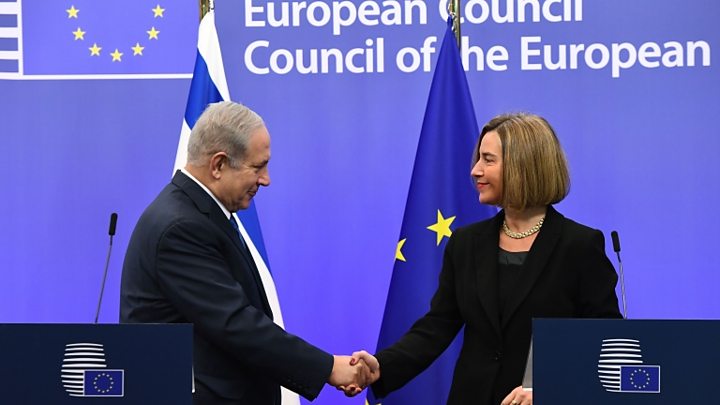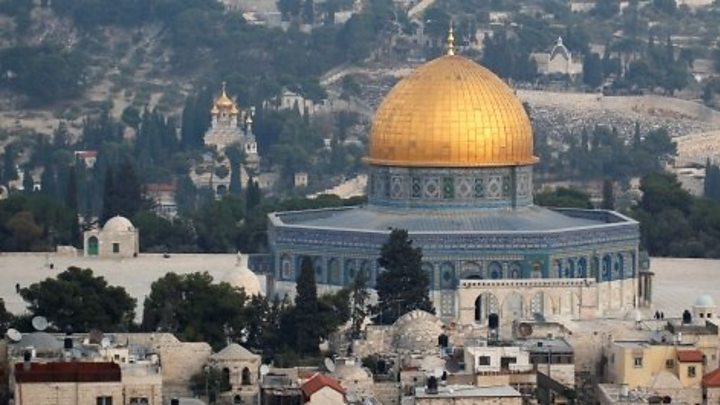By Ishaan Tharoor, Washington Post, December 12, 2017
Russian President Vladimir Putin made a surprise visit to Syria on Monday as part of a whirlwind Middle Eastern tour. Putin, who also stopped in Egypt and Turkey, met leaders, posed for photo-ops, inked a huge energy deal and, all in all, played the part of an influential international statesman. While President Trump has sparked outrage across the region, Putin played the role of sober and dependable partner.
In Cairo, Putin announced the resumption of direct Russian commercial flights to the country for the first time since a plane bombing there in 2015. Discussions with President Abdel Fattah el-Sissi also circled around the signing of a Russian contract for a $30 billion nuclear energy plant as well as a possible agreement for the Russian air force to use Egyptian bases.
In Ankara, Putin met Turkish President Recep Tayyip Erdogan for the eighth time in 2017, further proof of how dramatically relations between the two countries have improved in the year since the assassination of the Russian ambassador in Turkey and the two years since Turkish forces shot down a Russian fighter jet. Erdogan and his allies have slowly come around to accepting that Russia simply outflanked them in Syria and, in any case, are more animated by their current grievances with Washington.
And what about Syria itself? On his first visit to the country since authorizing Russia’s 2015 military intervention there, Putin met President Bashar al-Assad, declared victory over the Islamic State and announced an imminent drawdown of Russian forces. “In two years, the Russian armed forces, together with the Syrian Army have defeated the most combat-capable group of international terrorists,” Putin said in a speech at Khmeimim air base near the Syrian coastal city of Latakia. “In connection with this, I have made a decision: A significant part of the Russian military contingent in the Syrian Arab Republic is returning home, to Russia.”
There’s a healthy amount of skepticism about what that “significant part” may add up to, but the moment still presents Russia a chance to gloat over the efficacy of its engagement in Syria. Critics at the time of the intervention, including yours truly, suggested that Moscow was walking into a quagmire. Two years later, however, Putin has demonstrated both that Russia stands by its friends and that it can project power well beyond Eastern Europe.
“As America shrank from its traditional role in the Middle East, Russia expanded its own, making an ostentatious show of fighting Islamist terrorists on behalf of a reluctant Western Christendom,” wrote the Atlantic’s Julia Ioffe in a recent cover story on Putin’s strategy.
By comparison, two successive U.S. administrations have struggled to come up with a coherent Middle East policy. Commentators of various stripes lambaste the Obama administration for turning on the Arab strongmen who were traditional U.S. allies before the pro-democracy uprisings of 2011 and then for not doing enough to unseat Assad as the rebellion in Syria picked up steam.
Paradoxically, Trump–who decries a legacy of U.S. wars in the region–made a big show of launching missiles at a Syrian government airfield after the Assad regime carried out a chemical weapons attack on civilians earlier this year. Since then, however, he has shown little interest in Syria beyond executing the final stages of the Obama-era campaign against the Islamic State, which included the recent recapture of the city of Raqqa. Trump also ended U.S. covert support for Syria’s beleaguered “moderate” rebels.
Trump’s latest fracas isn’t likely to help, either. In Ankara, alongside Erdogan, Putin capitalized on disquiet over Trump’s move to recognize Jerusalem as Israel’s capital. He emphasized that Trump’s order “doesn’t help the Mideast settlement and, just the other way round, destabilizes the already difficult situation in the region.”
A Pew survey conducted this year among people in a number of countries in the region found that 64 percent see Russia as more influential in Middle Eastern affairs than compared to a decade ago. That perception may grow in the months to come, with Russia well-poised to benefit. “For many local actors, Russia’s increasing presence seems to be more appealing as a source of some balance,” wrote Turkish academic Talha Kose in the Daily Sabah, a pro-Erdogan newspaper. “The Trump administration’s erratic moves like the recent declaration of Jerusalem as the capital of Israel will only accelerate the decline of U.S. influence and pave the way for Moscow.”
According to Salem, the Russians are “not interested in a new Cold War, but they will take their opportunities” to expand their influence in the Middle East and play the part of an international power. Their efforts to do so will include exporting arms and civilian nuclear energy–as seen in the mooted deal with Egypt–and cultivating access to potentially huge natural gas deposits in the eastern Mediterranean.
Politically, as Trump enters heavy-handedly on one side of the Saudi-Iranian rivalry, Salem says the Russians will “nibble wherever they can, happy to be an effective number two player” in the Middle East in contrast to the chaotic role played by the United States.
“Moscow has a strategy, is executing it through timely and well-considered policies that have successfully strengthened its position not only with Iran but also with our allies and across the entire Middle East,” wrote Stephen Blank of the conservative American Foreign Policy Council. But, he added, that’s not the case for Washington: “U.S. involvement has degenerated into a series of spasmodic and at best tactical moves and at worst unfocused rage against notional threats even as we resolutely fail to deal with the actual threats to our position and influence.”
Russian President Vladimir Putin made a surprise visit to Syria on Monday as part of a whirlwind Middle Eastern tour. Putin, who also stopped in Egypt and Turkey, met leaders, posed for photo-ops, inked a huge energy deal and, all in all, played the part of an influential international statesman. While President Trump has sparked outrage across the region, Putin played the role of sober and dependable partner.
In Cairo, Putin announced the resumption of direct Russian commercial flights to the country for the first time since a plane bombing there in 2015. Discussions with President Abdel Fattah el-Sissi also circled around the signing of a Russian contract for a $30 billion nuclear energy plant as well as a possible agreement for the Russian air force to use Egyptian bases.
In Ankara, Putin met Turkish President Recep Tayyip Erdogan for the eighth time in 2017, further proof of how dramatically relations between the two countries have improved in the year since the assassination of the Russian ambassador in Turkey and the two years since Turkish forces shot down a Russian fighter jet. Erdogan and his allies have slowly come around to accepting that Russia simply outflanked them in Syria and, in any case, are more animated by their current grievances with Washington.
And what about Syria itself? On his first visit to the country since authorizing Russia’s 2015 military intervention there, Putin met President Bashar al-Assad, declared victory over the Islamic State and announced an imminent drawdown of Russian forces. “In two years, the Russian armed forces, together with the Syrian Army have defeated the most combat-capable group of international terrorists,” Putin said in a speech at Khmeimim air base near the Syrian coastal city of Latakia. “In connection with this, I have made a decision: A significant part of the Russian military contingent in the Syrian Arab Republic is returning home, to Russia.”
There’s a healthy amount of skepticism about what that “significant part” may add up to, but the moment still presents Russia a chance to gloat over the efficacy of its engagement in Syria. Critics at the time of the intervention, including yours truly, suggested that Moscow was walking into a quagmire. Two years later, however, Putin has demonstrated both that Russia stands by its friends and that it can project power well beyond Eastern Europe.
“As America shrank from its traditional role in the Middle East, Russia expanded its own, making an ostentatious show of fighting Islamist terrorists on behalf of a reluctant Western Christendom,” wrote the Atlantic’s Julia Ioffe in a recent cover story on Putin’s strategy.
By comparison, two successive U.S. administrations have struggled to come up with a coherent Middle East policy. Commentators of various stripes lambaste the Obama administration for turning on the Arab strongmen who were traditional U.S. allies before the pro-democracy uprisings of 2011 and then for not doing enough to unseat Assad as the rebellion in Syria picked up steam.
Paradoxically, Trump–who decries a legacy of U.S. wars in the region–made a big show of launching missiles at a Syrian government airfield after the Assad regime carried out a chemical weapons attack on civilians earlier this year. Since then, however, he has shown little interest in Syria beyond executing the final stages of the Obama-era campaign against the Islamic State, which included the recent recapture of the city of Raqqa. Trump also ended U.S. covert support for Syria’s beleaguered “moderate” rebels.
Trump’s latest fracas isn’t likely to help, either. In Ankara, alongside Erdogan, Putin capitalized on disquiet over Trump’s move to recognize Jerusalem as Israel’s capital. He emphasized that Trump’s order “doesn’t help the Mideast settlement and, just the other way round, destabilizes the already difficult situation in the region.”
A Pew survey conducted this year among people in a number of countries in the region found that 64 percent see Russia as more influential in Middle Eastern affairs than compared to a decade ago. That perception may grow in the months to come, with Russia well-poised to benefit. “For many local actors, Russia’s increasing presence seems to be more appealing as a source of some balance,” wrote Turkish academic Talha Kose in the Daily Sabah, a pro-Erdogan newspaper. “The Trump administration’s erratic moves like the recent declaration of Jerusalem as the capital of Israel will only accelerate the decline of U.S. influence and pave the way for Moscow.”
According to Salem, the Russians are “not interested in a new Cold War, but they will take their opportunities” to expand their influence in the Middle East and play the part of an international power. Their efforts to do so will include exporting arms and civilian nuclear energy–as seen in the mooted deal with Egypt–and cultivating access to potentially huge natural gas deposits in the eastern Mediterranean.
Politically, as Trump enters heavy-handedly on one side of the Saudi-Iranian rivalry, Salem says the Russians will “nibble wherever they can, happy to be an effective number two player” in the Middle East in contrast to the chaotic role played by the United States.
“Moscow has a strategy, is executing it through timely and well-considered policies that have successfully strengthened its position not only with Iran but also with our allies and across the entire Middle East,” wrote Stephen Blank of the conservative American Foreign Policy Council. But, he added, that’s not the case for Washington: “U.S. involvement has degenerated into a series of spasmodic and at best tactical moves and at worst unfocused rage against notional threats even as we resolutely fail to deal with the actual threats to our position and influence.”











































